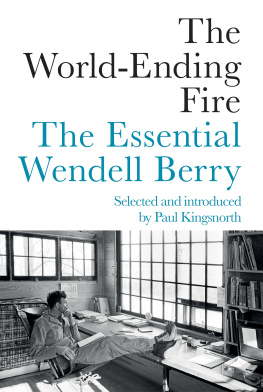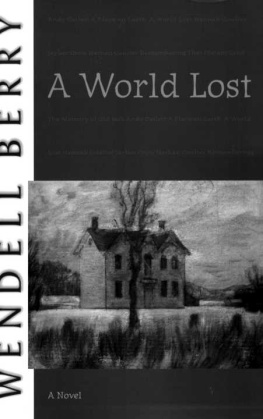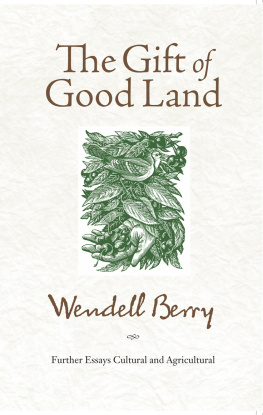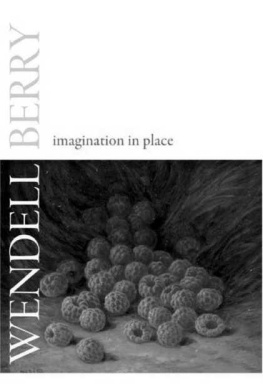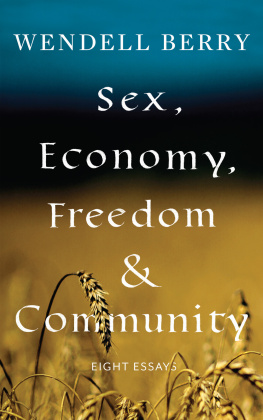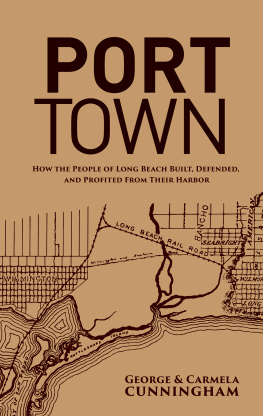A Place in Time

A Place in Time
Twenty Stories of the
Port William Membership

COUNTERPOINT
BERKELEY
A Place in Time: Twenty Stories of the Port William Membership
Copyright 2012 by Wendell Berry
All rights reserved under International and Pan-American Copyright Conventions. No part of this book may be used or reproduced in any manner whatsoever without written permission from the publisher, except in the case of brief quotations embodied in critical articles and reviews.
This book is a work of fiction. Names, characters, places, and incidents either are products of the authors imagination or are used fictitiously. Any resemblance to actual events or locales or persons, living or dead, is entirely coincidental.
Library of Congress Cataloging-in-Publication data is available.
ISBN: 978-1-61902-131-0
Cover and interior design by David Bullen
The cover painting Springdale by Harlan Hubbard is used courtesy of Dr. Robert and Charlotte Candida, with thanks to Meg Shaw.
Map and genealogy designed by Molly OHalloran.
Genealogy prepared by David S. McCowen.
Counterpoint Press
1919 Fifth Street
Berkeley, CA 94710
www.counterpointpress.com
Distributed by Publishers Group West
10 9 8 7 6 5 4 3 2 1
In memory of James Baker Hall,
who was the first friend
of the fiction of Port William

Contents

In my work I always need help. I have often asked for help, and as often have received it. But being helped, for me, has not been merely a necessity. It is half the pleasure of doing the work.
This books dedication to James Baker Hall acknowledges a debt that has been accumulating interest for nearly sixty years. My late dear friend Don Wallis read most of these stories and wrote me letters about them that not only improved my writing but were happy events in themselves. Tanya Berry listened to every story in first draft, made the first typescripts, and as always helped me along as critic, editor, and consultant. David Charlton typed the computer versions of every story, and kindly endured my second thoughts, revisions, and additions for what must have seemed to him a time much longer than it actually was. When I became unsure about some technical matters in The Dark Country and A New Day, David Kline and Jason Rutledge led me to solid ground. And I am grateful indeed for this further step in my long collaboration with Jack Shoemaker of Counterpoint, and with David Bullen.
I give my thanks also to the editors of the magazines in which the stories were first published or reprinted: The Girl in the Window, Fly Away, Breath, Andy Catlett: Early Education, Drouth, and Not a Tear, in the Threepenny Review; Down in the Valley Where the Green Grass Grows, A Burden, and Who Dreamt This Dream? in the Oxford American; Burley Coulters Fortunate Fall, The Dark Country, A New Day, Mike, and An Empty Jacket in the Sewanee Review; A Desirable Woman and A Place in Time in the Hudson Review; Misery in Shenandoah; Stand By Me and Sold in the Atlantic; The Requirement in Harpers; and At Home in Orion. Drouth also appeared in Farming. A New Day and Down in the Valley Where the Green Grass Grows also appeared in The Draft Horse Journal.
There is as much in that little space within the heart, as there is in the whole world outside....
What lies in that space, does not decay when the body decays, nor does it fall when the body falls.
The Ten Principal Upanishads,
Put into English by Shree Purohit
Swmi and W. B. Yeats
Tell ye your children of it, and let your children tell their children, and their children another generation.
JOEL 1:3

A Place in Time

They might as well all have been the same bunch, although they werent. Sometimes there would be enough gray uniforms or uniform pieces among them to permit them to be identified (perhaps) as Rebels. Sometimes they would be more formally recognizable as Yankees because they would all be dressed in uniforms that would be blue. Sometimes, because of their unlikeness to one another and to any living thing ever before seen in Port William, you couldnt tell who they were. Whoever they were, the town shut itself against them like a terrapin closing its shell. From the yards and porches and storefronts along the single street, people withdrew behind doors. People who had ridden into town in a wagon or on horseback got themselves and their animals out of sight, if they could. Otherwise, they were apt to have to get away on foot, their mules or horses requisitioned, and if the younger men could get away at all before being arrested or recruited.
The Yankees would be looking for persons disloyal to the Union, a category not clearly defined, or for revenge against perpetrators of disloyal acts, which also were not well-defined or perhaps even definable. The Rebels would be on the lookout for recruits. The others, the self-described irregulars or guerillas, would be actuated, as like as not, by some local grudge going back a long time before the war. All of them, always, were looking for any livestock that could be ridden, worked, or eaten, anything that could be eaten, anything usable as a weapon, anything portable that was worth carrying away, any opportunity for amusing themselves by any of the cruelties available to those who had abjured, seemingly forever, the laws of kinship and friendship and neighborhood.
And Port William was isolated, beyond the reach of official help, too small and divided even to consider defending itself, both too Southern and too near the Ohio River.
Doing freely, beyond constraint or compunction, the things that it seemed men would do if they got the chance, they all were trouble, trouble when they were present, trouble when they were gone, no end of trouble. She feared them all, and therefore she hated them all.
She was Rebecca Dawe, daughter of Maxie and James John Dawe, sister of Galen Dawe who had been killed by a neighbor as he was leaving to join the Confederate army at the start of the war. Her two older sisters were at home on the river bottom farm down by Dawes Landing where their father had a store, and where the family and their handful of slaves provided more help in fact than was needed. She could be spared. And so she had come up to Port William to help her aunt Dicey, her mothers sister, with her young children, to help with the work of the household, for her greater safety as her parents saw it, and as she herself saw it for relief from isolation in the great space of the river valley and from her parents grieving.
And Dicey needed her. Until Rebecca came, walking barefoot up from the river, carrying her shoes and extra clothing bundled in a shawl, Dicey had been alone with her three children, the oldest almost still a baby, and what she called her little dab of livestock: a milk cow, two shoats, and by now a bare dozen hens. Like some of the other houses in Port William, the Needlys fronted a small farm, theirs going narrowly all the way back to the woods on the river bluff. Diceys husband, Thomas Needly, the towns only blacksmith, was in the federal military prison in Louisville for an act of disloyalty. One evening past dark, working mainly by feel, he had reset a shoe on a strangers horse. He had charged nothing. The stranger, who was in a hurry, had not asked what he owed, and Thomas, in the circumstances and from experience, was afraid to name the price. But the stranger had been the wrong one to help out with such a favor. He was a wanted man. He was caught, and on his testimony Thomas Needly was charged with aiding him in his attempt to escape.


